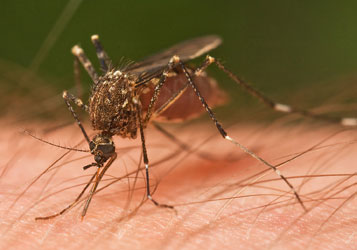Mosquito Control

Mosquitoes are a major insect pest problem in Colorado and may seriously deter outdoor activities and tourism. These insects cause economic losses in cattle and other livestock through blood loss, disease transmission and irritation. Mosquitoes also can transmit certain human diseases such as West Nile virus, Western Equine Encephalitis. The incidence of mosquito-transmitted disease in Colorado is closely monitored by public health agencies.
West Nile Virus: What causes it?
The infection is transmitted by mosquitoes. They acquire the virus after biting an infected bird, and then they bite us. In 2006 there were 4269 cases of West Nile Virus with 177 deaths. Virus transmission occurs mostly during warm weather, when mosquito populations are active. In the northern part of the country, infections occur mainly in the summer and early fall, but in the warmer southern regions, the virus can be transmitted all year. The incubation period - or the period between when you're bitten by an infected mosquito and the appearance of signs and symptoms of the illness - ranges from two to 14 days.

Signs and Symptoms:
Most of the time, infection with West Nile virus makes people mildly sick. A person may get flu-like symptoms such as fever, headache, body aches, and sometimes skin rash and swollen glands. More severe infection can result in encephalitis, which includes symptoms of severe headache, high fever, neck stiffness, disorientation, and sometimes convulsions. It's rare but, severe West Nile infection in healthy, younger people can be fatal, but the elderly are at greatest risk for severe complications.
How to know if you have West Nile Virus:
The virus causes an infection that can lead to inflammation of the brain (swelling) much like encephalitis, or swelling of the spinal cord, or the tissues surrounding it and the spinal cord like meningitis. If the doctor thinks you might have the virus, they will ask you questions to see if you were at risk for getting the virus. If you have symptoms that the virus is affecting the brain and spinal cord a blood test will be done to see if you have antibodies to the virus. And sometimes a Lumbar Puncture (spinal tap) is done to look for the virus.
Treatment for the Virus:
There is currently no specific treatment for the virus. Mild infections go away on their own. But severe cases of encephalitis are treated with supportive care in a hospital. This care involves helping the body fight illness on its own. It often is used when no specific treatment exists for an illness, as is the case with some viruses. Treatment for West Nile virus can include receiving fluids through IV, or help with breathing using a ventilator, and prevention of another infection like pneumonia.


